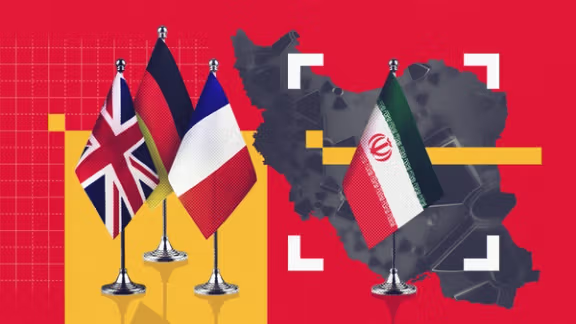Europe ‘lacks legitimacy’ to trigger UN sanctions return, Iran says

Iran opposes any attempt by European powers to activate the UN sanctions snapback mechanism, the foreign ministry said on Monday after recent nuclear negotiations in Istanbul.

Iran opposes any attempt by European powers to activate the UN sanctions snapback mechanism, the foreign ministry said on Monday after recent nuclear negotiations in Istanbul.
“We have clearly said, and we stress, that the European parties do not have the legitimacy or the authority to invoke the so-called snapback mechanism,” foreign ministry spokesman Esmail Baghaei said during his weekly press briefing in Tehran.
Talks held with European representatives, Baghaei said, were focused solely on Iran’s nuclear program and sanctions relief.
“No other topics were raised in these negotiations,” he added.
Delegates from Britain, France, and Germany—collectively known as the E3—met at the Iranian Consulate in Istanbul on Friday for their first discussions since the 12-day war in June between Iran and Israel, during which US bombers targeted Iran's three heavily fortified nuclear sites.
Iran conveyed its opposition directly to its European counterparts to any snapback effort, according to Baghaei.
“Such a right does not exist for them, and we fundamentally reject the move,” he added.
Under the terms of the 2015 nuclear deal, known formally as the Joint Comprehensive Plan of Action, the snapback clause allows for the reimposition of UN sanctions if a participant claims significant non-compliance.
Baghaei also dismissed European narratives of the recent negotiations. “The European side has presented its own version of events, but this account does not align with the facts and differs from the viewpoint of the Islamic Republic of Iran,” he said.
Earlier on Sunday, France said it will push for sweeping global embargoes on Iran unless a broader deal is reached by the end of August covering not just Tehran’s nuclear program but its missile and regional activities.
Tehran excludes defense from nuclear talks
Iran’s nuclear negotiations with European powers remain narrowly confined to sanctions relief and atomic issues, the foreign ministry spokesman added, rejecting any suggestion of broader terms.
“These talks have a clear and limited focus: the lifting of sanctions and matters related to the nuclear program,” Baghaei said.
“Any attempt by some Western states to introduce unrelated issues only reflects their confusion and lack of coherence.”
Iran’s defense matters, Baghaei said, are not on the table and will not be subject to negotiation. “Especially under current conditions, Iran is more determined than ever to maintain and enhance its deterrent capability.”
No plans for talks with US
Iran is not pursuing negotiations with the United States, Baghaei said, ruling out direct dialogue under current conditions.
“The Islamic Republic of Iran at present has no plan to negotiate with the United States,” he added.
“Whenever national interests and necessities demand, an appropriate decision will be taken and announced.”
Blaming Israel for Zahedan attack
The Iranian diplomat blamed Israel for supporting armed groups following a deadly attack in the southeastern city of Zahedan that killed several people on Saturday.
“There is no doubt that the Zionist regime provides financial and logistical support to terrorist groups targeting Iran,” Baghaei said. “This reality has been proven repeatedly over the years.”
He described the Zahedan attack as “a clear act of terrorism” and said its goal was to disrupt public security.
“These actions are aimed at creating insecurity in Iran and threatening the safety of its citizens. This terrorist act is strongly condemned.”
Nine people, including three assailants, were killed and 20 others wounded in an armed attack on a courthouse in the city.
“These attacks are part of a broader pattern of crimes committed by the Zionist regime against Iran,” he added. “The message is clear: this regime will stop at nothing to destabilize Iran’s security.”
Iran’s judiciary chief also on Monday blamed foreign powers for Zahedan attack. “Such acts of terrorism undoubtedly originate from global arrogance, led by the criminal United States,” Gholam Hossein Mohseni Ejei said.